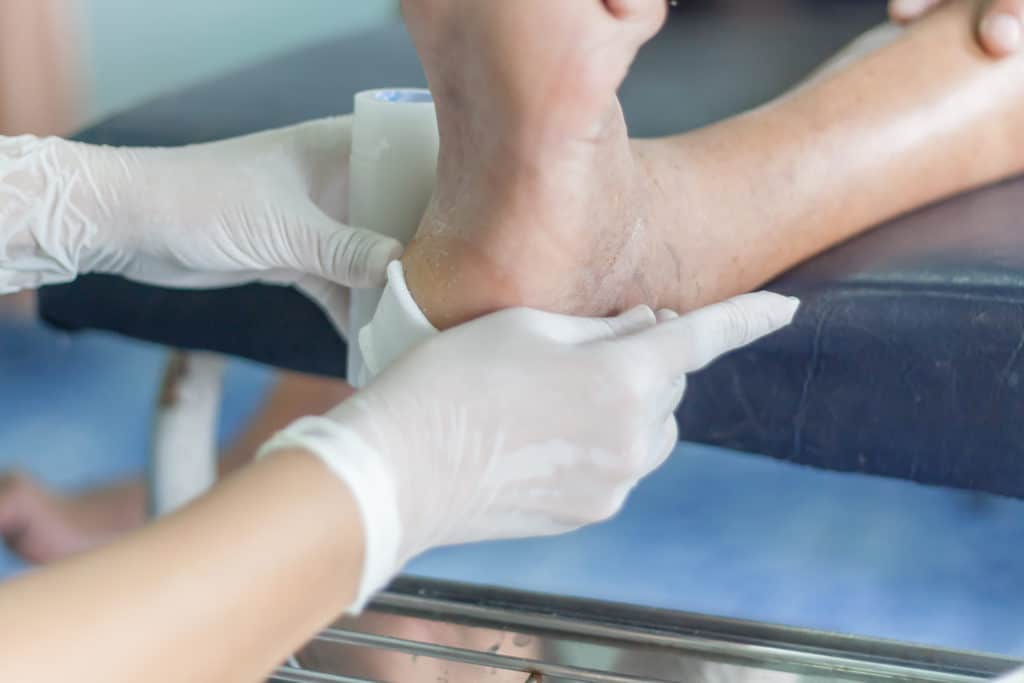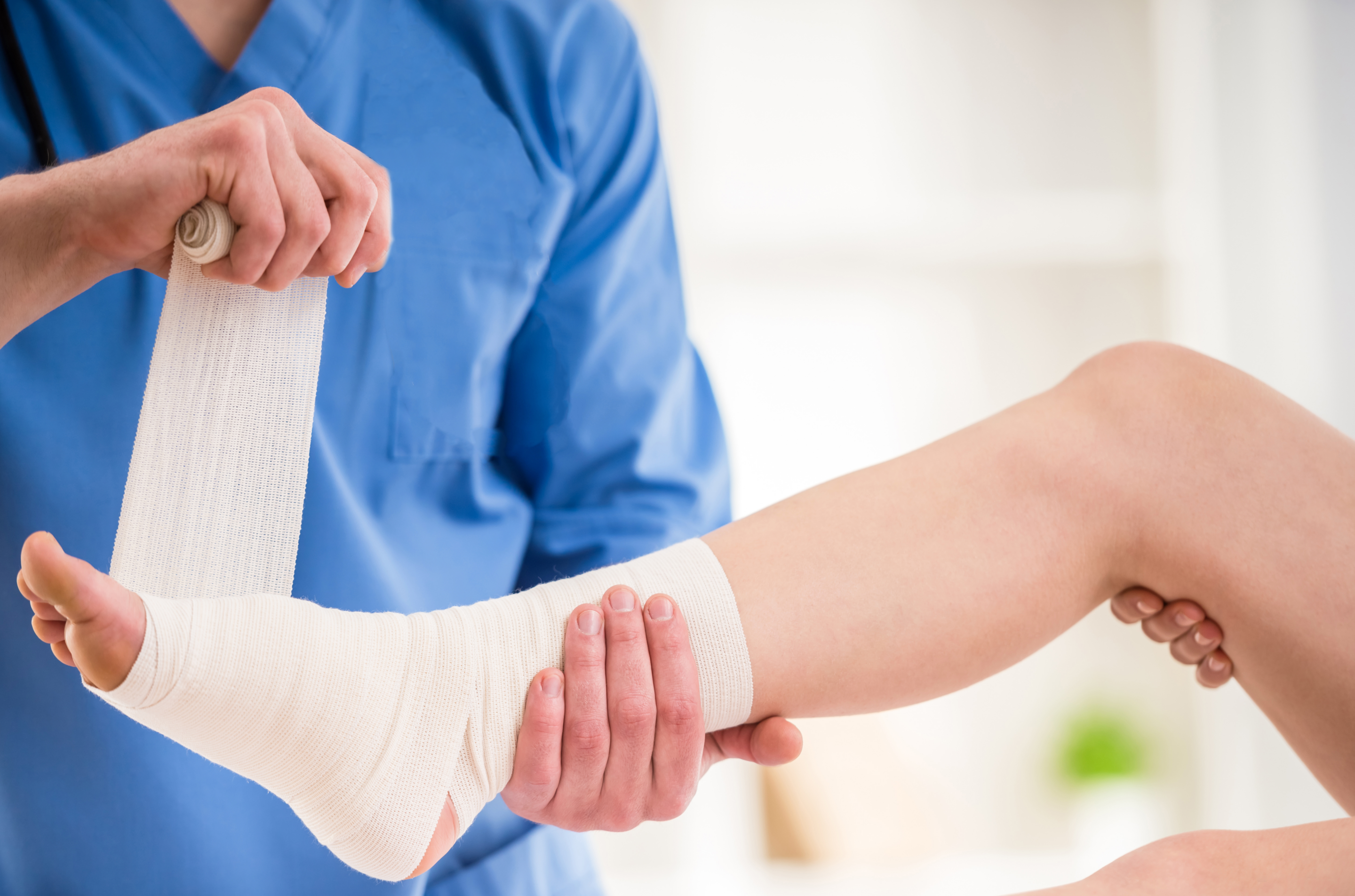Wound Care
Proper cleaning, dressing, and observation of a wound help prevent infections and speed healing. However, sometimes wounds refuse to heal with just home care, and you need to seek professional help. When it comes to your lower extremities, our doctors at the Foot & Ankle Associates of Greater Pittsburgh can help with treating wounds from small to extreme.
Wound care with our team involves monitoring the progress of your injuries, such as checking the temperature, bleeding, smell, or discharge. Our specialists can determine the best treatment after observing the type of wound on your lower extremities. Professional wound care will help avoid complications, including situations that may require amputation.
What is Wound Care?
Wound care is managing a wound through its different healing stages to optimize your healing potential. It involves determining the specific type of skin or tissue damage and providing a custom plan with regular follow ups to heal as quickly as possible.
After examining your wound, our team will provide proper care to stimulate healing and minimize infection. Caring for a wound on a specific part of the body, like your feet or ankles, can reduce pain and improve your quality of life.
What Causes Wounds on the Feet or Ankle?
A wound on your feet or legs can become a serious problem. Some of the most common causes are trauma, diabetes, and issues with circulation. Diabetes is the leading cause of non-traumatic lower extremity amputations in the United States, and over 80% of these amputations are preceded by a foot ulcer. Other causes of foot and ankle wounds are:
- Blisters resulting from accidents like heat or friction
- Different types of bites and injuries
- Puncture wounds
- Surgical wounds
- Foreign bodies such as splinters or broken glass
- Scrapes
- Infection
Who is at Risk of Foot and Toe Ulcers?
Anybody can get foot and toe ulcers, especially if you don’t correctly manage wounds well. People with conditions like heart disease, diabetes, poor circulation, or kidney problems are at a higher risk. Other risk factors include.
- Obesity
- Lifestyle behavior, for example, people who use tobacco
- Foot deformities that cause increased pressure on an area
- Neuropathy, regardless of the cause
How Can I Identify a Foot or Toe Ulcer?
Any disruption in your skin is a potential problem. Ulcers often develop underneath calluses that are ignored for too long. Inspecting your feet daily is an important part of maintaining healthy feet, especially for patients with neuropathy that have a decreased sense of touch in the feet.
Foot and toe ulcers also have depth, and they can vary. For example,
- The wound can be shallow with broken skin
- If deep enough, tendons may be exposed
- Some of the worst ulcers will break down the tissue until your bone is exposed
- Conditions like necrosis can be on the front part of your foot or the entire foot
What Happens During Wound Care Visits?
- Debridement: This involves thoroughly cleaning a wound to remove unhealthy tissue, bacteria that forms in the ulcer, and foreign materials/debris. Debridement is a vital component of wound care as it keeps the wound healthy and healing.
- Wound dressing: This is where our team covers the wound with a special material that will protect it from infections and maintain a healthy environment while the ulcer heals.
- Negative wound pressure therapy: Also known as wound vacs, these are often used in deeper wounds that require assistance filling in depth.
- Antibiotics: Sometimes antibiotics are necessary to help your body fight off infection. These are tailored depending on what is causing the infection.
- Skin substitutes: If needed, our doctors will use advanced wound care products that act similar to skin grafts harvested from your own body, without the need for a painful procedure. Skin substitutes are not always necessary, but can be helpful in chronic, non-healing ulcers.
Why is it Important to Get These Wound Treatments?
As previously mentioned, over 80% of non-traumatic lower extremity amputations in the United States start with an ulcer. It is extremely important to seek out expert care if you develop an ulcer, especially if you have diabetes or poor circulation.
- Complications can come on fast for people with diabetes and/or neuropathy, so treatment should be sought quickly.
- Infections can cause even the smallest wound to turn into a huge problem.
- Lower extremity ulcers that do not heal on their own need the help of a professional team with experience in wound care.
When Should I Seek Wound Care Help?
If you have diabetes and/or poor circulation, the moment you notice a wound on your foot, you should seek professional help. Treating a wound as soon as possible minimizes the risk of infections, hospitalizations, and amputations.
Anyone else should seek help immediately for any major wounds, infected wounds, or wounds that have not improved with at-home first-aid care. If you are unsure, it is better to have a wound examined and evaluated than regret playing it by ear.
Contact Us for Advanced Wound Treatment
Our team has wound care specialists who can treat your toe, foot, and leg wounds no matter the size. We can then provide the best treatment options to get you on the path of healing and recovery.
If you have a wound and are unsure what to do, call our office in Beaver at (724) 774-1525, or fill out our online contact form. Do not allow your wound to get worse. We can help you.
Contact Us
Office
336 College Avenue, Suite 106, Beaver,
PA , 15009
Monday: 8am – 12pm
Tuesday: 8am – 4:30pm
Wednesday: 8am – 4:30pm
Thursday: 8am – 4:30pm
Friday: 8am – 12pm
Saturday: Closed
Sunday: Closed


